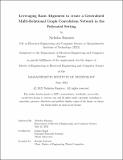Leveraging Basis Alignment to create a Generalized Multi-Relational Graph Convolution Network in the Federated Setting
Author(s)
Ramirez, Nicholas
DownloadThesis PDF (709.4Kb)
Advisor
Kagal, Lalana
Terms of use
Metadata
Show full item recordAbstract
Knowledge graphs have seen a significant rise in popularity and usage in recent years with many real-world applications taking advantage of their ability to model interlinked data easily. In general, many institutions maintain their own knowledge graphs, however these graphs tend to suffer from incompleteness. This is due to two main reasons: knowledge is naturally distributed across institutions and institutions are unable to share sensitive data. With this in mind, federated learning appears to be a promising solution to this problem as it enables clients to develop a shared global model without sharing any data. This thesis aims to solve the knowledge graph completion problem by introducing a federated learning protocol for the state-of-the-art Knowledge Embedding Based Graph Convolutional Network (KE-GCN) [51]. KEGCN was chosen for it’s unification of multiple graph convolutional networks and it’s ability to provide as much flexibility as possible for clients. As a result, my federated protocol, Fed-KE-GCN, is focused on data privacy and flexibility. In addition to Fed-KE-GCN, this thesis empirically shows that a common approach for differential privacy for deep learning, Differentially Private Stochastic Gradient Descent (DP-SGD) [2], is not viable in this domain due to the nature of graph data and the internal framework of Graph Convolutional Networks.
Date issued
2023-06Department
Massachusetts Institute of Technology. Department of Electrical Engineering and Computer SciencePublisher
Massachusetts Institute of Technology